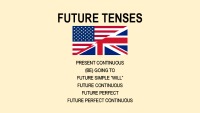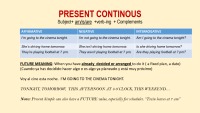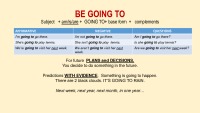English Future Tenses: Present Continuous, Going To, Future Simple „Will“, Future Continuous, Future Perfect, Future Perfect Continuous



Future tenses. Present continous. Subject+ am/is/are +verb-ing + complements. Be going to. Subject + am/is/are + GOING TO+ base form + complements. Future simple “will”. Subject+ will (‘ll) + base form + Complements. Be going to vs. Future simple “Will”. Future continuous. Subjet+ will (‘ll) + be+ verb-ing+ Complements. Future perfect. Suject+ will (‘ll)+ have+ participle + Complements. Future perfect continuous. Subject+ will (‘ll)+ have+ been +verb-ing+ complements. Practice ( all tensesKey.
Present continuous (be) going to future simple “will” future continuous future perfect future perfect continuous.
FUTURE MEANING: When you have already decided or arranged to do it ( a fixed plan, a date) (Cuando ya has decidido hacer algo o es algo ya planeado y está muy próximo) Voy al cine esta noche. I’M GOING TO THE CINEMA TONIGHT. TONIGHT, TOMORROW, THIS AFTERNOON AT 8 0’CLOCK, THIS WEEKEND... Note: Present Simple can also have a FUTURE value, especially for schedules. “Train leaves at 7 am”.
BE GOING TO
For future PLANS and DECISIONS. You decide to do something in the future. Predictions WITH EVIDENCE. Something is going to happen. There are 2 black clouds. IT’S GOING TO RAIN. Next week, next year, next month, in one year...
FUTURE SIMPLE “WILL”Subject+ will (‘ll) + base form + Complements.
PREDITIONS about the future with NO EVIDENCE (something you think it will happen: think, believe, expect, hope...) I think I will pass the exam 2) You decide to do something AT THE TIME OF SPEAKING It is raining. I’ll take an umbrela.
- Languages Presentations
- MS PowerPoint 133 KB
- 2020 m.
- English
- 10 pages (766 words)
- School
- August

















